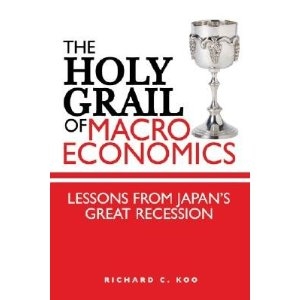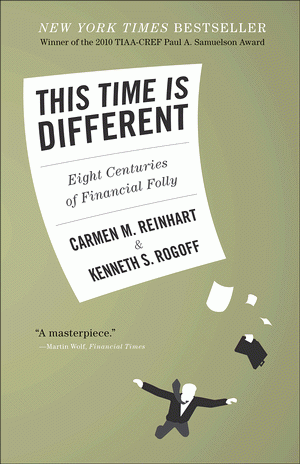stagnation?
What case is there for reducing the budget deficit and public debt burden now? Will such actions save the economy from sharply reduced growth or will cutting government spending and/or raising taxes lead to a collapse of demand and a long period of Japanese style deflation and stagnation?
Economists sharply disagree on what many are now calling “the austerity debate.” Some prominent economists (for example, INET Advisor Kenneth Rogoff) believe that cutting deficits and reducing debt is essential to inspire confidence in financial markets and to ensure that long-term economic growth is not damaged (see Rogoff’s recent op-ed here. Others (for example Paul Krugman and Robert Skidelsky, who spoke at INET’s inaugural conference) think that any attempt to reduce expenditures today will be self-defeating since it will further weaken the economy, lead to lower growth and reduced tax revenues in the future, and so greater deficits and debt in the end.
This deficit debate is extremely relevant right now. The cut-the-deficit view has become quite pronounced in Europe, with the new Conservative government’s austerity drive in the United Kingdom as a prime example. On the other side, the Obama Administration has actively urged developed nations to maintain their public investment until the global economy more fully recovers.
This deficit debate is not new. In fact, John Maynard Keynes and Fredrik Hayek, the two economic giants of the 1930s who we partly based our inaugural conference at King’s College on, laid our their version of the debate in dueling newspaper articles in October 1932 ( See the images here.)
What new ideas does economics have to offer about these issues today? Richard Koo’s wide-ranging analysis of the Japanese deflation is one of them, based on the nearest historical example of a developed country experiencing a real-estate and financial crash followed by an economic downturn. In a talk that kicked off INET’s inaugural conference in Cambridge and in a deep interview that followed it, Koo lays out his concept of a “balance sheet recession,” the idea that in severe downturns such as this one, the normal functioning of financial markets is disrupted. In this analysis, the private sector does not take advantage of easy liquidity and borrow at low interest rates to invest, but instead seeks to pay down debt and shore up their balance sheets. This leads to a situation where the private economy begins to contract as all companies or households try to cut back on borrowing and investing, which increases the incentive for the private sector to save. In such a spiral, Koo argues, the only way to prevent the economy from a complete collapse is to have the government borrow from financial markets and spend while actors in the private sector consolidate their balance sheets and recover.
There are other ways to view the issue. Ken Rogoff lays out his perspective in a countervailing talk given alongside Koo at the opening of our inaugural conference. Within that camp, questions are raised about what kinds of expenditures can be reasonably reduced without undermining growth too much. There is debate within the anti-austerity group as well about the composition of spending. How much of expenditure should be focused on the short-term and how much on more long-term projects? INET Advisor Jeff Sachs argues for the long-term investments.
Clearly this overarching question about what to do about public deficits is a rich one, one which we want our community to ponder, and hopefully, come up with some fresh new insights as well.
Related Questions
Question on the Stimulus Route: What are the kinds of expenditures that should be undertaken if further stimulus proceeds? Does long-term expenditure constitute a better way of thinking about stimulus, such as what Jeff Sachs advocates (FT of 7/22), or Robert Leighninger in ” Long-Range Public Investment: The Forgotten Legacy of the New Deal (Social Problems and Social Issues (Univ of South Carolina)?”
Question on the Reduction Route: If deficit reduction is to take place, what kinds of expenditures should be cut? Is reducing expenditures on social security, as suggested by some, a viable/credible/desirable way of reducing deficits but protecting growth? Are there other cuts to expenditures that should be considered?
More Fundamental Question: A fundamental assumption that underlies all of these questions is that we need an economy that grows. Is it possible to transition to an economy that does a better job of supporting people and the planet without growth? And if so, how do we think about deficits within that context?” (Peter Victor’s book, “Managing without Growth: Slower by Design and Not Disaster” is one example of this kind of thinking.)
Historical Question: What can historical examples beyond Koo’s Japanese example provide in terms of guidance to the current challenges? Do the examples of countries (including Sweden, United Kingdom, and 18 others) outlined in Alesina and Ardagna (2010) PDF have much to say about the current situation, or is the situation more akin to that described by Almunia et al. 2010. How useful is it to the United States, the largest economic power in the world that also maintains the world’s defacto currency, that other countries (such as Canada) were able to export their way out of a recession, or that Ireland could devalue its currency to stimulate foreign investment?
Suggested Books and Online Resources

The Holy Grail of Macroeconomics: Lessons from Japan’s Great Recession: Richard Koo

This Time Is Different: Eight Centuries of Financial Folly
: Kenneth Rogoff and Carmen Reinhart

Long-Range Public Investment: The Forgotten Legacy of the New Deal
: Robert D. Leighninger Jr
The Austerity Debate at the Financial Times
Sow the Seeds of Long-Term Growth by Jeffrey Sachs
Why the Battle is Joined Over Tightening by Martin Wolf
These Anti-Keynesian Arguments Look Flimsy by Lord Skidelsky
Trichet’s Whole Doesn’t Equal the Sum of its Parts by Mark Blyth
James Galbraith’s Testimony Blasts Fiscal Commission (New Deal 2.0)
Notes on Ken Rogoff by Paul Krugman, New York Times (Wonkish)
Overreaching Claims of Debt “Threshold” Suffer from Theoretical and Empirical Flaws (Economic Policy Institute)

